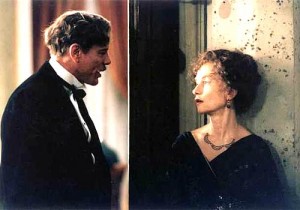Gabrielle – each unhappy marriage is unhappy in its own way.

love knows best how to hurt
![]()
Gabrielle – Patrice Chereau
Intimacy, whether physical or emotional carries a risk only mitigated by love. Whether loss of intimacy destroys love, or loss of love destroys intimacy is an emotional issue of some substance. Yet unresolvable. What is chillingly true is that when love dies, earlier intimacy empowers each partner with an almost forensic insight into precisely how and where to hurt the other most. Ask Paul McCartney.
It is clear that Gabrielle no longer loves her husband. It is moot whether she ever did. But in another fascinating but emotionally unfathomable female role (e.g.The Piano Teacher), Isobelle Huppert as Gabrielle, pitilessly demonstrates with icy calm the insight that indifference cuts much deeper than dislike. It is hard to like Jean Hervey, he is smug, complacent, pompous and emotionally more childish than child-like. Charmless and awkward with feelings, especially sexual, so repressed he has no idea how to deal with them when they break the surface calm of his life. But in the face of the implacable indifference with which Gabrielle treats him, concealed within the suffocating politeness of upper class social convention of 1890’s Paris, it is hard not to feel some grudging sympathy for him. Like an ugly moth impaled on a pin.
Jean is so emotionally obtuse that he almost seems to regard the absence of any real feeling in his marriage as an achievement. Nothing unexpected, uncontrolled, enters his perfectly ordered business or social existence. And his domestic life, thanks largely to Gabrielle’s effortless competence, is as safely protected against any disturbance as it is sterile. Inevitably Gabrielle has an affair. Then one day she leaves her husband a letter saying she has left him for another man. In an instant a shocked Jean sees his world in ruins around him – personal and social humiliation, and a disturbance in the order of his life that leaves him simply bewildered and helpless. So far so predictable, but what happens next provides the fascination of Conrad’s short story (The Return) on which the film is based – a day later she comes back. She makes it clear to Jean that she does not and will not love him and still loves his rival, a man he deeply dislikes who edits one of his publications. She makes no effort to justify her affair. But what incenses Jean most is that she refuses to explain her return. To him this is quite literally inconceivable social behaviour. We feel he regards her coming back as more indecent and unconscionable than leaving him for another man in the first place. Almost: “having left, you might at least have had the common decency to stay away.”
Having destroyed in an instant all of Jean’s inherited bourgeois beliefs about his life and his marriage it is as if Gabrielle now relishes resuming their personally empty but socially accomplished marriage. Perhaps even enjoying her use against him of precisely those hypocritical social attitudes he lives by. He has to endure the humiliation of continuing with all his social activities as before but with everyone knowing not merely that his wife has had an affair, and with one of their own social group, but that he could not even prevent her coming back.
The emotional tension in this extraordinary situation becomes more and more acute. But Gabrielle has one last humiliation to heap upon her hapless husband. Sexual relations between them were short-lived after marriage. Jean anxiously tries to recover a sense of those early days. Suddenly seductive and encouraging, Gabrielle draws him into their bed. Then, as his urgent, anxious sexual feelings are aroused, she simply lies passively under his fumbling efforts to make love. No tender pretence here. No comforting simulation. At this point I must say one’s sympathies do shift. It is hard to imagine anything anyone could have done so appalling as to deserve such clinical destruction of another’s pride and self-respect. Jean rescues his dignity in the only way open to him – by refusing to accept sex under such circumstances. He loves Gabrielle. She does not, will not, love him. Yet they are bound together by something deeper and darker. Gabrielle cruelly confesses to Jean that she has been happy twice – first when she wrote the letter, second when she returned.
This is a disturbing, emotionally uncompromising film. Its characters are both credible and in Gabrielle’s case, unfathomable. It touches on the deep undercurrents of emotion raging beneath the surface calm of upper class social conformities. It displays a bleak perspective on personal relationships especially under the baleful influence of rules of class conduct so inviolate that even adultery must observe proper social standards.
Chereau’s film is very literary and theatrical in tone, especially early on. A narrator, surrogate for the author, and much wordy conversation progresses narrative and context. Yet once set up, the austere cinematography with dark, brooding interiors, unobtrusive editing and music that counterpoints the action, builds a powerful atmosphere. Having put us in the heads of the characters Chereau moves away from the literalness of words to exploit the allusiveness and open-endedness of image. Black and white images take us from the grittily real into colour that belies the bloodless, colourless social context of the story. If the early performances are theatrical in style, the main characters are later played, especially by a mesmeric Huppert in pure cinematic form. Some devices, like the occasional large screen-wide sub-titles echoing a silent film convention, don’t add much for me and seem intrusive and contrived. But these notwithstanding this is a beautifully modulated film, not least in Huppert’s performance.
A challenging night out. Romantics beware. But if a key part of art is to pose difficult questions rather than provide easy answers, Gabrielle succeeds very well.
Filed under: 4 stars, Drama, Europe/World cinema, General, Patrice Chereau, Philosophical, Political

